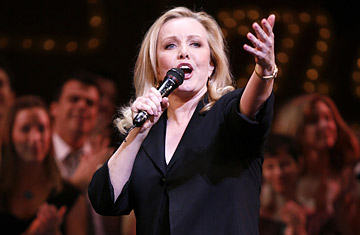
Susan Stroman
When Mel Brooks' The Producers closed on Broadway in April after more than six years, 12 Tony Awards and a billion dollars in worldwide ticket sales, director and choreographer Susan Stroman didn't get much time off. Stroman, Brooks and company are back with Young Frankenstein, a new musical opening on Broadway Nov. 8 that's based on Brooks' 1974 hit movie. Also readying a new ballet for Pacific Northwest Ballet and a new musical for Lincoln Center Theater, five-time Tony Award winner Stroman talked with TIME about life after The Producers.
Barbara Isenberg: As you developed Young Frankenstein, were you worried about the huge expectations surrounding another musical based on a Brooks movie?
Susan Stroman: I have a passion for the theater and for what I do. If a writer comes to me and says, "I have a script that could make a great musical," why would I not follow that through?
That seems particularly true if the writer is Brooks. What was it like working with him not once but twice?
He has the most spontaneous mind of anyone I ever worked with. He is constantly funny and smart. Writing a Broadway musical was so fulfilling for him, he wanted to come back to that world, and I was ready to do it all over again with him.
How would you characterize the appeal of Young Frankenstein?
There are people who love Mel Brooks, the Frankenstein story or just the idea of reanimating dead tissue. Horror aficionados who don't know much about the movie or the musical like knowing they'll get to see someone create a monster.
After the film version of The Producers musical fared so poorly at the box office, is it a relief to be back on Broadway?
Yes. In the theater, all the different artists — designers, actors, writers, musicians and others — drive toward opening night together. In the film world, your collaborators are only with you part of the way.
Did you worry there wouldn't be a show after Brooks lost Anne Bancroft, his wife of more than 40 years, in 2005?
When Mel first talked about Young Frankenstein, I never thought it would happen. It wasn't until after Anne's death that he really started to write. It was a release from his grief, and I think the writing saved him. When he lost Anne, he lost everything. Mel sees the audience laugh each night, and it infuses him with a big breath of life.
It was so similar to what happened when you and your late husband, the director Mike Ockrent, were starting work on The Producers.
It was. Mel egged me on to continue working on The Producers after Mike's death, and after Anne died, I encouraged him to work on Young Frankenstein. A show that is so filled with humor is a great antidote to grief. To laugh and to hear the sound of laughter is healing.
Laughter is that powerful?
When Mel walks down the street, people call out to him as if he is a best friend because he made them laugh. Just as people ran to The Producers after 9/11, I think they'll run from the evening news to see Young Frankenstein. During the Depression, people loved to go to musicals and the movies to escape.
Were you apprehensive about reimagining an iconic movie moment like the monster's star turn singing and dancing Irving Berlin's Puttin' on the Ritz?
No. That's where I live. I love the 1930s, tap dance and Irving Berlin. I couldn't wait to get my hands on that number.
During the curtain call for Young Frankenstein, there's a hint to the audience that Brooks' Blazing Saddles is waiting in the wings. Is that likely?
At the ends of Mel's movies, there's always some sort of indication that he's coming back. So at the end of this musical, there's a little nod to that possibility.
And if he comes by your house with a script for Blazing Saddles: The Musical?
I would schedule a production meeting right away.